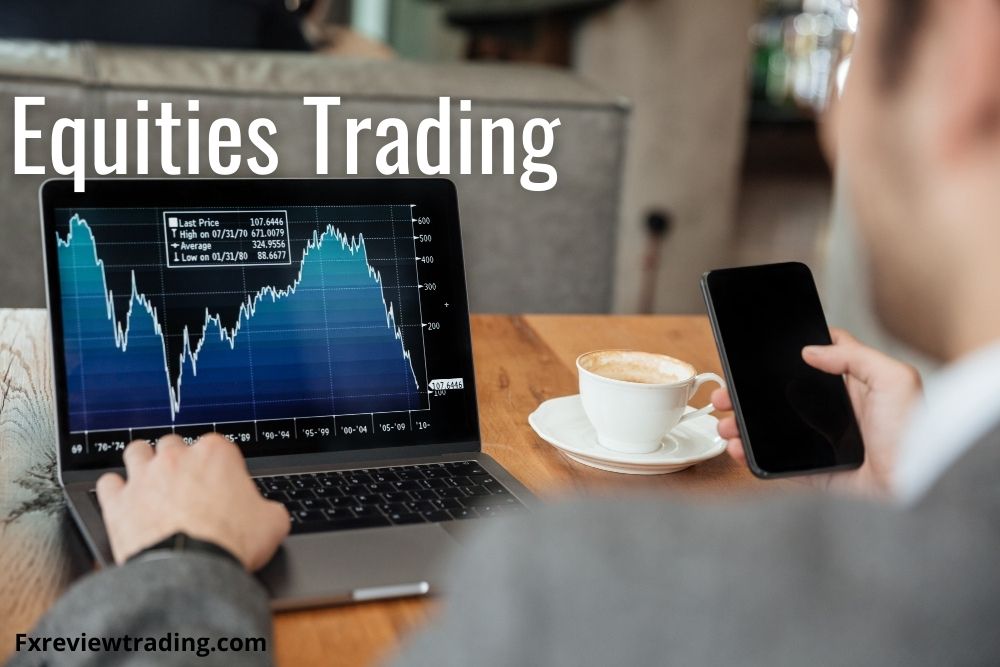A stock market is a huge place, and being the traditional financial market, it has high trade volume. Equities trading is part of the market where shares are traded from stock exchanges or through the over-the-counter markets.
Traders can buy and sell equity shares mostly of public companies, and there are a few ways that allow equity trading in stock markets. The list of company stock available with the stock exchange is provided; traders can select the one they find profitable and trade.
It is similar to stock trading, and traders can make money from it with a good investment strategy. To find out more and learn, let’s drive-in depth knowledge of what is equities trading?
Defining Equities Trading
In simple words, equity trading is buying and selling of company stock and shares. Traders can go for a range of equity fund investments in different financial companies. As trading of equities is possible through exchange-traded funds (ETFs).
The shares of stock of companies are called equities and are traded in the financial markets for profitable earnings. Traders can go for various types of investments in equity trading and diversify their trading risks.
As traded via stock exchanges, equity traders have to find the stock exchange that offers the shares of the company the trader is interested in. Or they may even trade equities through the over-the-counter market (OTC) that has brokers and private trading.
Equity trading offers traders direct ownership of the shares or underlying assets. In this, traders earn when the market price of share/ underlying asset increases. In addition, they can also enjoy the dividend payments.
But, when the share price falls, equity traders face loss and, therefore, should be careful while trading in equities.
What are Equities trading?
Equity trading we have defined, but what equity means should be known for successful trading. Equity in equity trading is the portion of ownership in a publicly listed company. Companies issue such stocks or shares in the market to raise money.
When traders buy equities, they have ownership and are entitled to any profits earned by the company. They can enjoy capital in two forms, the first is dividend payments by the company, and the second is the company’s capital growth.
The company’s brand name and its market position are what matter to have good dividends and capital profits.
Traded in the equity market where the shares of companies are issued, equity trading could also be called a stock market.
A company’s performance and market holdings decide its share worth, and traders can trade in the equity market accordingly.
Types of Equities?
Equity trading, as we know, is company-based; therefore, the types of equity are impacted by the size of the company. Traders can have the following equity in the market:
- Large Capital: These are the stocks of large companies with high capitalization. The company stock is also called blue-chip stock. Such equity shares offer regular dividend payments and have good market growth. The share price of such equity stocks is high.
- Middle Capital: The trading of medium size company shares is called the middle capital firm. The company stock has some risk in the financial market. However, the company has good market growth and continuous dividend payments.
- Small Capital: The most risky equity trading stocks are of a small capital company. These do not offer dividends and have small capitalization. But, the share price may be high, and it could be a successful company in the market.
How to Trade Equities?
Traders can invest in equities in various forms; they can day trade stocks, go for options trading, or any other trades whichever they find comfortable and fruitful. Here, we’ll be analyzing the ways that traders can use equity trading.
The most basic requirement for trading is the trading account. Without an account, traders cannot invest or trade in the market. They can find a reputed stock market broker and open their account by completing the procedure.
After that, they can deposit funds and trade in equities using any form. Below are ways of trading equities:
Day Trading
Trading in equities could be done with a day trading strategy; it is a short-term trading style that analyses the price movements. Traders can quickly take their decision to buy and sell equities and have the desired profits.
Traders can have a single position or multiple, depending on their choice, and have to end their position by the end of the day.
Social Trading
Social trading is also a good way of equity trading. Traders can follow professional traders, observe them and use the information for investment decisions. It is an effective trading technique as traders can make strategies and learn from observing.
A good choice for beginners in the equity market.
Scalping
Scalping is a short-term technique that allows traders to trade for a few seconds or minutes in the market. They have to be really quick with decisions and require good stock market knowledge.
For this, traders can use fundamental analysis or technical analysis that helps to understand the market and make judgments. Equity traders in scalping borrow the asset and trade.
Options Trading
Options trading is a derivative contract that allows traders to stock trading at a predetermined date and time. The price is specified, and traders can go for equities by buying and selling at a future date and period.
There are call and put options that traders can use in contracts and make good stock trading.
Equity market traders can use the given options to trade in the stock market or through the stock exchanges. They have to select the best method which supports their investment.
The trader then bids for the equity stock, and sellers ask for a certain price when this matches a sell occurs.
The trade, when done this way, takes place on market prices; the company offering equity is a publicly-traded company, with each stock being owned by traders.
However, when trading, traders of the equity markets should check the company’s assets and public standing. This is necessary to know the risks taken and have a good management strategy.
Stock Exchanges
The stock exchange is the necessity for trading; these are the places that list the publicly listed companies’ shares and let traders trade. The stock exchanges could be physical or virtual, and traders can trade with anyone that has the equity shares required.
An example of a physical stock exchange is the London stock exchange, and an example of a virtual stock exchange is NASDAQ. Both allow the issue of publicly traded stocks of various companies.
The company issues stock to expand their business or for various other reasons. Mostly due to technology, the trading is online through a network of computers. Many stock exchanges offer such services as traders highly prefer trading online.
These exchanges provide equity and preferred stock to trade in the share market. It is up to traders what they find worth investing in and make their choice.
Although, the selection should be based on market factors, the market price of shares, investment objectives, the company’s performance, etc.
There are companies that have their stocks listed on many stock exchanges. Traders can have a wide variety to choose from and make their investments.
Risks of Equities
Traders of the stock market can have high risks because of market volatility. The prices of stocks keep fluctuating as there are many fundamental and technical aspects impacting the market.
Stocks are based on the performance of the company in the market, and their value is dependent on many economic and fundamental factors. Therefore, traders should use fundamental and technical analysis tools to predict the changes and make informed decisions.
When trading in equity markets, traders have a lot of options; they can go for CFDs, ETFs, day trading, spread betting, etc.
In CFDs and spread betting traders do not have ownership and bet on the rise and fall of the asset’s price. They have high risks, and even such traders use leverage products to trade, thus, increasing the risks.
Another risk of the stock market is volatility. The price of shares is uncertain and can change at any time of the day. This could be due to economic reasons, political, industry-based, or any other change in the market.
The emotions of traders are the risk that could also be a factor of loss. Controlling the emotions of traders is a must for benefiting from the trade.
So, traders have to be careful while they trade in the stock market.
Pros and Cons
Traders can have the following advantages and disadvantages when trading in the shares:
Pros:
- Good for wealth creation
- Traders can enter and exit trade easily
- Shares have a low tax charge
- The great long term investment
Cons:
- Requires expertise
- Volatile market
- Risk of trading
Conclusion
Trading in the stock market or equity market is considered a good choice as many traders have heard or known the market trading in some or another way. The stock market offers equity and preferred stock to trade with different features.
Traders can select the best one with the article we have discussed and focused solely on equity market trading. It will certainly benefit traders in knowing equity trade and how they can trade in it.








